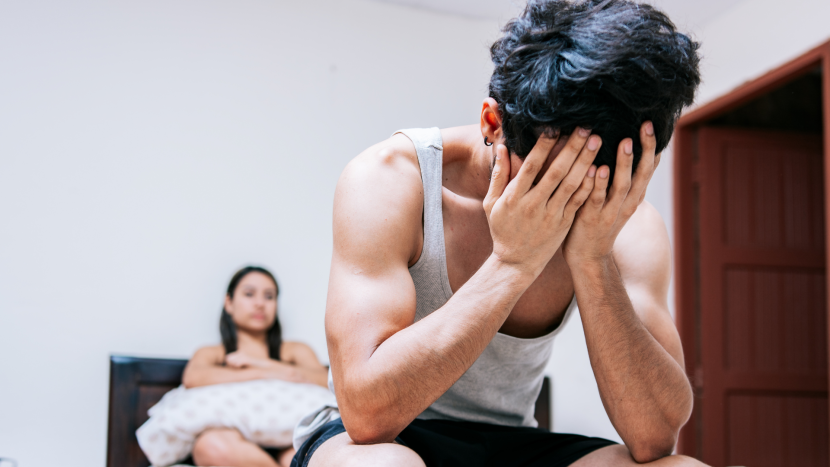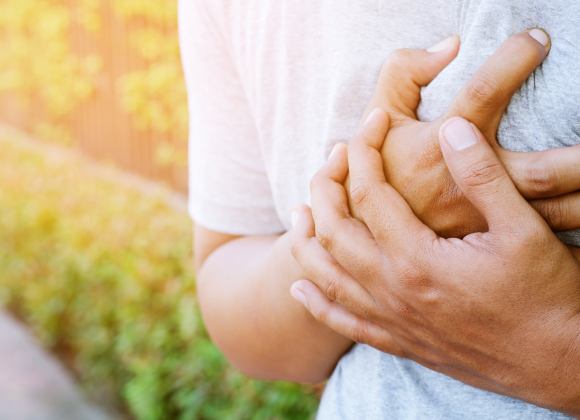Erectile Dysfunction (ED), often seen as an older man’s issue, is quietly affecting more young men than ever. Research shows that up to 26% of men under 40 experience ED, with cases rising sharply in their 20s and 30s.
Why the surge? A mix of modern stress, mental health struggles, poor lifestyle choices, and even excessive pornography use could be responsible. Conditions such as obesity, diabetes, and high blood pressure are also appearing earlier in life, and all are known contributors to erectile dysfunction.
The good news is that most of these causes are treatable or preventable. By managing stress, improving diet, quitting smoking, and seeking therapy, young men can regain control. Let us explore the real reasons behind erectile dysfunction in younger men and how to address them effectively.
Psychological Factors
In younger men, psychological factors are often the root cause of erectile dysfunction. Unlike older men, where physical health issues dominate, men under 50 are more likely to struggle with ED due to stress, anxiety, or emotional distress.
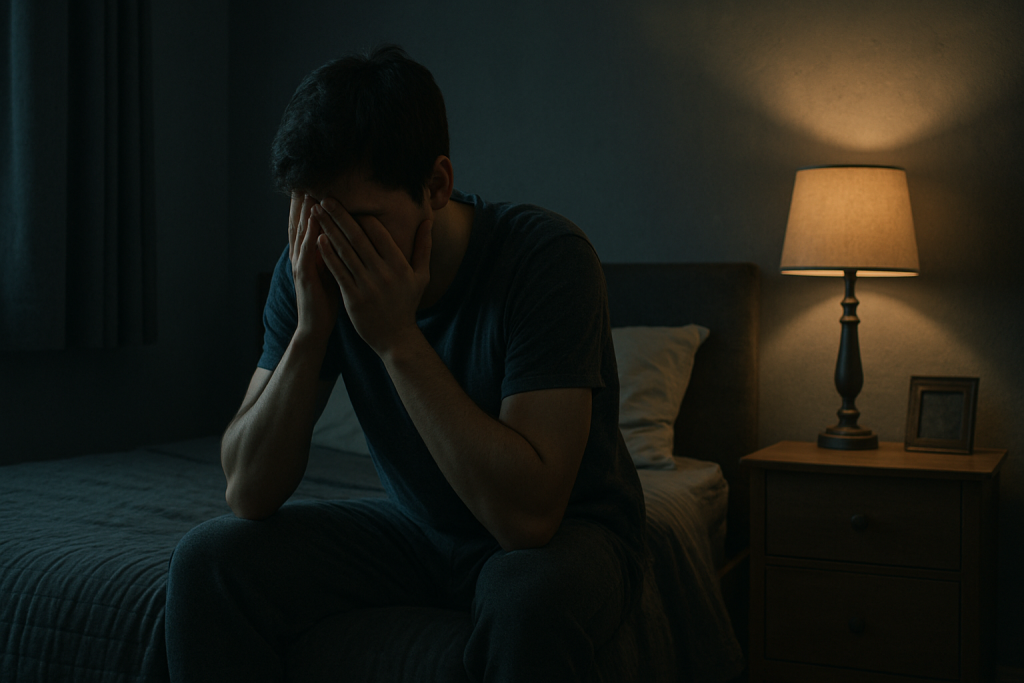
- Stress & Performance Anxiety: Worrying about how you’ll perform can become the reason you can’t. Stress from work or relationships can also disrupt sexual arousal, which starts in the brain.
- Depression & Mental Health: When you’re feeling mentally low, your desire and pleasure signals often decrease as well, which can lead to erectile dysfunction.
- Relationship Issues: Tension, poor communication, or lack of trust in a relationship can turn intimacy into anxiety.
Psychological ED is often situational — morning or solo erections may still occur, but partner sex becomes difficult. The good news? With therapy, communication, and stress reduction, many young men can overcome it and regain confidence.
Lifestyle and Habits
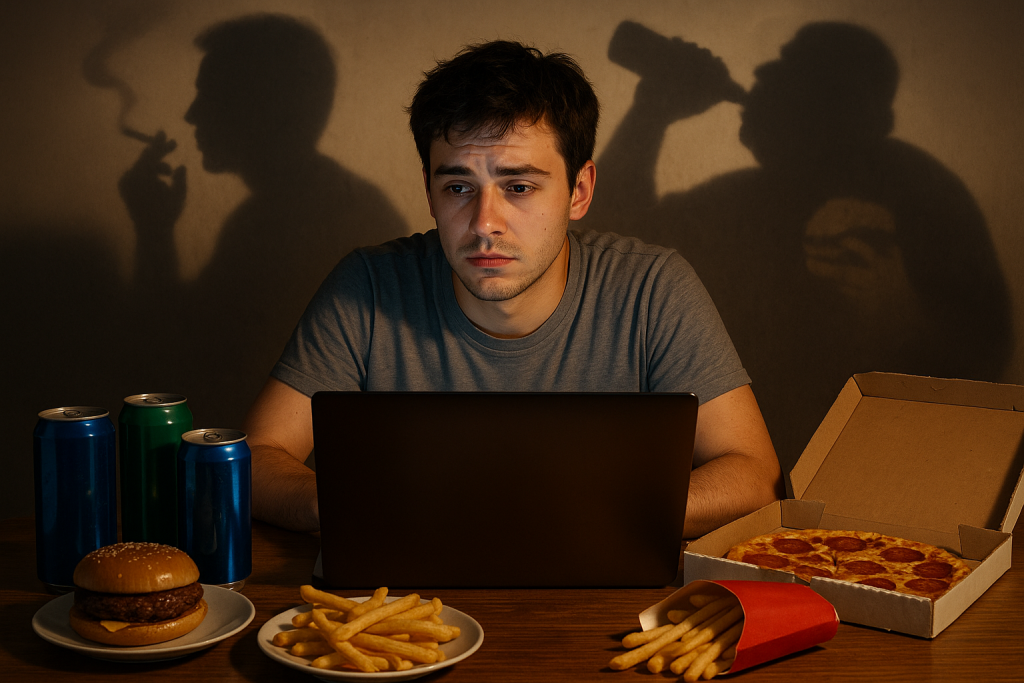
Even in your 20s or 30s, everyday habits can play a major role in erectile dysfunction. Poor lifestyle choices mess with your blood flow, hormone levels, and nerve health — all essential for strong erections. Here’s how:
- Smoking narrows blood vessels and damages circulation, making it harder to get or keep an erection.
- Heavy drinking dulls the nervous system and long-term abuse can wreck hormone balance and nerve function.
- Drug use — from cocaine to opioids — disrupts brain chemistry and blood flow, often leading to ED.
- Poor diet + no exercise = a dangerous combo. Obesity, high cholesterol, and diabetes all increase ED risk.
Most of these causes are totally reversible. Quit smoking, moderate your drinking, ditch the drugs, move more, and clean up your diet.
Physical Health Conditions
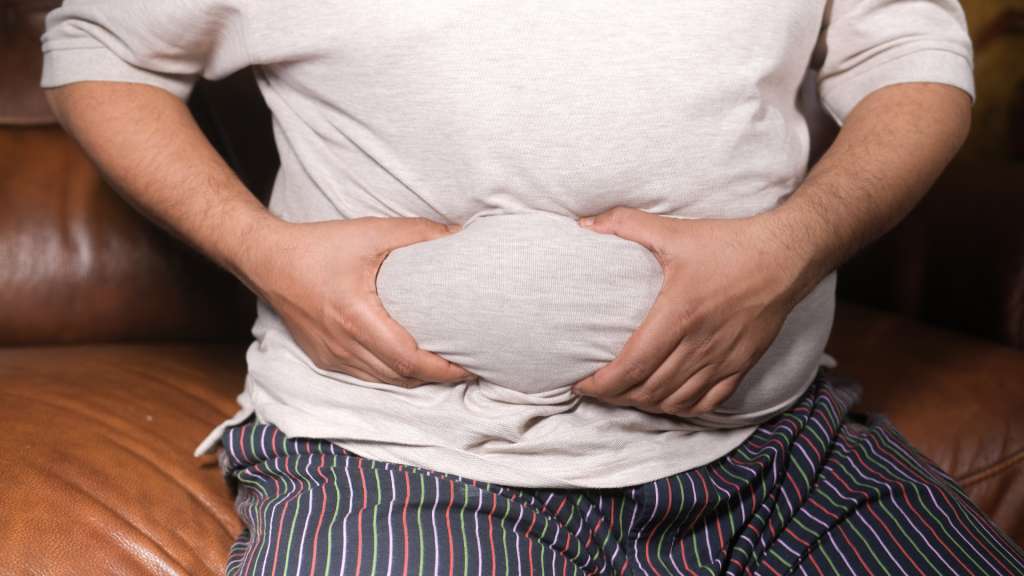
Erectile dysfunction isn’t always about mindset or stress — sometimes, your body is trying to tell you something more serious. Even young men can experience ED due to hidden health issues. Here’s what might be going on:
- Heart & Circulation Problems: Clogged arteries or high blood pressure can reduce blood flow to the penis. In fact, ED is often an early warning sign of heart disease.
- Diabetes: High blood sugar damages nerves and blood vessels, making erections harder to achieve. ED can be one of the first signs of diabetes.
- Obesity: Extra weight increases the risk of ED by affecting hormones, stamina, and circulation. The good news? Losing weight often improves sexual function.
- Other Conditions: Sleep apnea, kidney disease, MS, or pelvic injuries can also interfere with erections — even in your 20s.
If you’re a young man facing ED, don’t ignore it — it could be the first sign of a hidden health issue like diabetes or high blood pressure. Early diagnosis leads to better treatment and better health.
Hormonal Imbalances
Hormones are the behind-the-scenes players in your sex life — and when they’re off balance, erectile dysfunction can follow, even in young men. While not the most common cause, hormonal issues are worth checking if you’re struggling with ED. Here’s what to watch for:
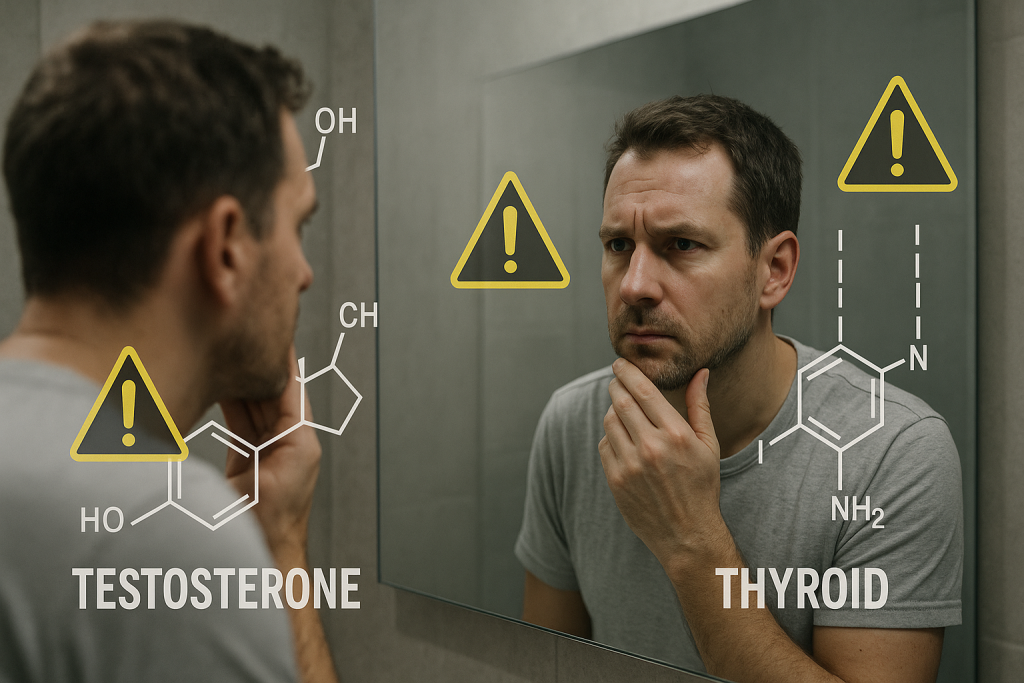
- Low Testosterone: If your sex drive has tanked and energy is low, low T might be the culprit. It affects erections, mood, and stamina.
- High Prolactin: Often caused by a benign tumor, this hormone spike can dull desire and cause ED.
- Thyroid Trouble: Whether overactive or sluggish, your thyroid can throw off sexual function — but it’s fixable.
- Steroid Use: Using anabolic steroids or abusing testosterone can actually crash your natural hormone production and wreck your erections.
If ED is suspected to be hormone-related, doctors can test levels of testosterone, prolactin, and thyroid hormones. Treatment—like hormone therapy or stopping steroid use—often helps. While rare in healthy young men, hormonal imbalances can still be a key factor worth checking.
Medication Side Effects
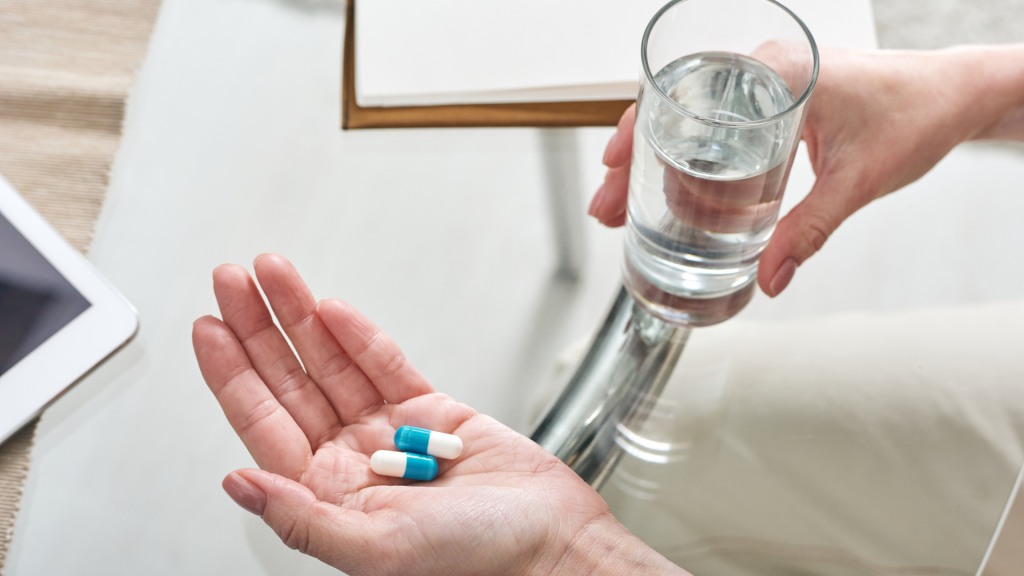
Medications can quietly interfere with your sex life — and many young men don’t realize it. Certain drugs affect blood flow, nerves, or hormones, leading to ED as a side effect. Common culprits include:
- Antidepressants (SSRIs): They lift your mood but can lower your libido or make erections harder.
- Blood Pressure Meds: Some, like beta blockers and diuretics, can reduce blood flow.
- Allergy Meds: Antihistamines like Benadryl can dull the erectile response.
- Painkillers & Others: Long-term opioids, prostate meds (like finasteride), and sedatives can all affect sexual function.
Think a medication is causing your ED? Don’t stop it on your own. Talk to your doctor—adjusting the dose or switching meds often helps.
Overuse of Pornography
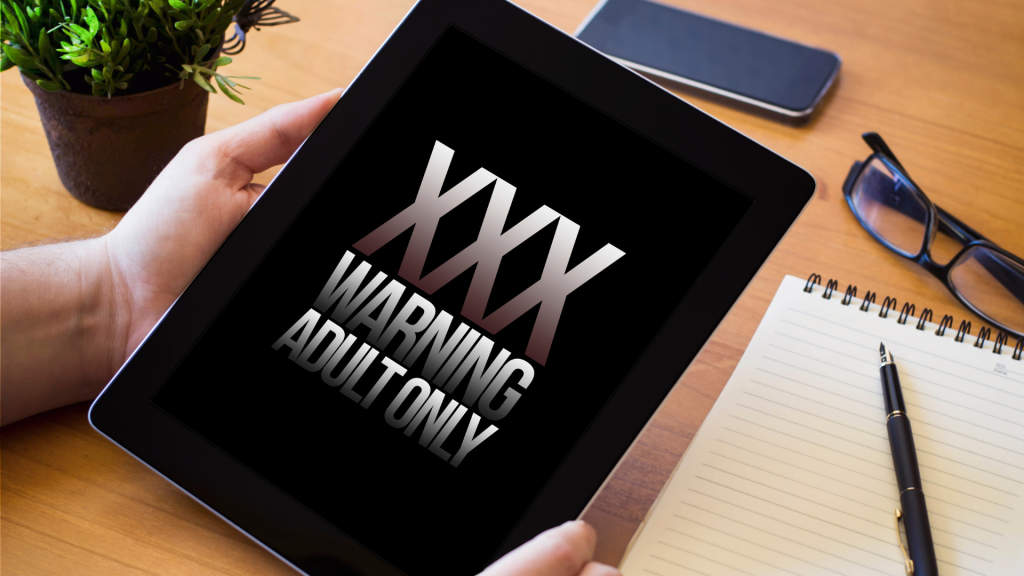
In the digital age, easy access to porn has sparked concern over its link to ED in young men — a trend some call porn-induced erectile dysfunction (PIED).
The idea? Constant exposure to intense, unrealistic adult content may desensitize your brain, making real-life intimacy feel less exciting. This can lead to trouble getting or keeping an erection with a partner. Many men report that quitting or cutting back on porn helped restore their sexual function.
But science is mixed — not all studies agree porn causes ED. Some experts believe it’s not the porn itself, but the guilt, anxiety, or unrealistic expectations that come with it.
Moderate porn use is usually harmless, but too much can affect arousal for some men. If it’s impacting your sex life, take a break, reconnect with real intimacy, and consider talking to a therapist.
Prevention and Lifestyle Advice
Want to keep your sex life strong? It starts with how you live. Many cases of ED in young men are tied to habits you can change. Here’s how to take control:
- Quit Smoking: It damages blood flow — quitting helps your erections recover.
- Drink Less: Stick to 1–2 drinks/day. Too much alcohol dulls nerves and hormones.
- Say No to Drugs: Recreational drugs and misused meds can wreck your performance.
- Move More: Exercise boosts testosterone, heart health, and confidence.
- Eat Smart: A balanced diet fights ED-causing conditions like obesity and diabetes.
- Manage Stress: Chronic stress crushes libido. Try meditation, hobbies, or therapy.
- Prioritize Sleep: Poor sleep messes with hormones and energy. Aim for 7–9 hours.
- Care for Your Mind: Mental health matters. Don’t ignore anxiety or depression.
- Talk to Your Partner: Honest, pressure-free intimacy can ease anxiety and rebuild connection.
Treatment Options for ED in Young Men
Struggling with ED in your 20s or 30s? Don’t stress — it’s common, treatable, and often reversible. The key is finding the cause and tackling it head-on. Here’s how:
- Get a Professional Checkup: Start by seeing a doctor. It’s not embarrassing — it’s smart. They’ll check for issues like low testosterone, diabetes, or early heart problems. ED can be a red flag for deeper health issues, so don’t ignore it.
- Fix Your Lifestyle: Often, changing habits like quitting smoking, getting active, eating better, and sleeping well can resolve mild ED.
- Try Therapy: If stress, anxiety, or depression are in the mix, counseling or sex therapy can help big time. Many young men beat ED just by reducing performance pressure and improving emotional health.
- Consider Medications: PDE5 inhibitors like Viagra (sildenafil) or Cialis (tadalafil) work well for many. They improve blood flow — but only with proper medical guidance.
- Treat the Root Cause: Got diabetes? High blood pressure? Hormonal issues? Fix those first — your erections will likely follow.
- Other Options: If pills don’t work (rare in young men), treatments like penis pumps, injections, or even implants exist — but these are typically last resorts.
Conclusion
Erectile dysfunction is not just an “older man’s problem” — it is real, increasing, and affecting more young men than ever before. The good news is that ED is highly treatable and often reversible. Whether the cause is stress, lifestyle choices, health conditions, or even excessive pornography use, there is almost always a clear reason and a way to overcome it.
If you are dealing with ED, know that you are not alone. Many men have faced this challenge and emerged stronger. Begin by evaluating your daily habits, managing your stress levels, and seeking professional support. With the right steps, including therapy, a healthier lifestyle, and medical treatment, you can take back control of your sexual health and self-confidence.
Stay informed, stay proactive, and above all, remember that support is available and recovery is completely possible.

